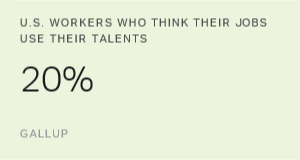Story Highlights
- Half of college alumni strongly agree their education was worth the cost
- Caring professors raise odds of feeling education was worth it
Amid recent controversy over rising tuition and mounting student debt totals, half of college graduates in the U.S. (50%) "strongly agree" that their undergraduate education was worth the cost. This figure varies only slightly between alumni of public (52%) and private nonprofit (47%) universities, but drops sharply to 26% among graduates of private for-profit universities.

Recent graduates, those who have obtained their bachelor's degree beginning in 2006, are significantly less likely to strongly agree with this statement. Only 38% of recent alumni strongly agree their education was worth the cost.
The question, which is included in the new , is particularly relevant given the growing attention on the cost of higher education in the U.S. In November 2014, CNN captured the fervor over the issue with its documentary film Ivory Tower. The film cited some alarming statistics: Tuition has been rising at nearly three times the rate of inflation in recent years, and the total amount of outstanding student loan debt in the U.S. has grown to over $1.2 trillion. Presidential candidates from both major parties have already announced proposals for addressing the issue.

Relationships Most Affect Graduates' Perception That Their Education Was Worth the Cost
Some observers have argued that commonly used college rankings such as the ones published by U.S. ║┌┴¤═° & World Report each year have actually worsened the situation. They claim that this particular ranking fails to measure many aspects of college life that help students make the most of their college years. Though the 2015 scores assigned to 200 national universities by the U.S. ║┌┴¤═° & World Report rankings are clearly related to graduates' likelihood to strongly agree that their college experience was worth the cost, they explain only about one-third of the variation in alumni responses.
The ║┌┴¤═°-Purdue Index was developed to add to education leaders' understanding of the true value colleges provide by identifying and tracking student experiences related to alumni success and well-being after graduation.
Among the most important results from this year's study is the conclusion that having had supportive relationships with faculty members and other mentor figures powerfully influences graduates' estimation of their college experience. Specifically, alumni's strong agreement with any of the following three statements almost doubles the odds that they unreservedly believe their education was worth the cost:
- My professors at [University Name] cared about me as a person.
- While attending [University Name] I had a mentor who encouraged me to pursue my goals and dreams.
- I had at least one professor at [University Name] who made me excited about learning.
The graphic below presents the increase in graduates' likelihood to strongly agree their education was worth the cost if they remembered having each of the listed college experiences. To help isolate the direct relationship between these questions, the analysis controls for graduates' employment status and amount of student loan debt. It also uses results from a five-factor personality scale to help account for personality traits that might cause graduates to rate both their college experiences and their post-college lives positively.

Bottom Line
Amid the heated debate about the costs and benefits of higher education in the U.S., and the finding that recent graduates are less likely to believe their education was worth the cost, the ║┌┴¤═°-Purdue Index brings some positive news: Higher education leaders and other stakeholders have opportunities to increase their university's value to undergraduates. They can do this by focusing on factors that help students make the most of their college years. Key among these factors are relationships with people who can help students stay fully engaged in their education and focused on the future it will help them achieve. In particular, faculty and other mentors can foster these student goals.
Learn more about how the works.
Read the full .
Survey Methods
Results for the ║┌┴¤═°-Purdue Index are based on Web surveys conducted Dec. 16, 2014-June 29, 2015, with a random sample of 30,151 respondents with a bachelor's degree or higher, aged 18 and older, with Internet access, living in all 50 U.S. states and the District of Columbia.
The ║┌┴¤═°-Purdue Index sample was recruited via the ║┌┴¤═° Daily tracking survey. The ║┌┴¤═° Daily tracking survey sample includes national adults with a minimum quota of 50% cellphone respondents and 50% landline respondents, with additional minimum quotas by time zone within region. Landline and cellular telephone numbers are selected using random-digit-dial methods.
║┌┴¤═°-Purdue Index interviews are conducted via the Web, in English only. Samples are weighted to correct for unequal selection probability and nonresponse. The data are weighted to match national demographics of gender, age, race, Hispanic ethnicity, education and region provided by the Current Population Survey.
All reported margins of sampling error for the ║┌┴¤═°-Purdue Index of all college graduates include the computed design effects for weighting.
For results based on the total sample of those with a bachelor's degree or higher, the margin of sampling error is ±0.8 percentage points at the 95% confidence level.
For results based on employee engagement of those with a bachelor's degree or higher, the margin of sampling error is ±1.0 percentage point at the 95% confidence level.
In addition to sampling error, question wording and practical difficulties in conducting surveys can introduce error or bias into the findings of public opinion polls.
